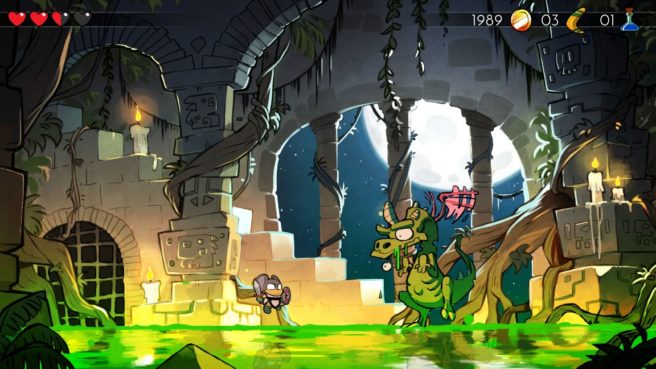Wonder Boy: The Dragon’s Trap developers talk about project’s history, going from fan to developer
Developer Lizardcube’s lead programmer, Omar Cornut, spoke at length about the history of Wonder Boy: The Dragon’s Trap in a recent interview with Siliconera. Several topics were discussed, such as the transition of going from fan to developer and what the team behind the game wanted to change in the remake of the title.
Omar on his history with the title and how the project got started:
I’ve been tackling emulation of the Master System since 1999, and was always involved with hacking and reverse engineering games of this era. So, I built up that knowledge over time. A few years ago, I decided to use my spare time to start studying the code of the original game ROM. My desire, at the time, was to unearth unknown secrets. It is a game with lots of subtle secrets and behaviors. Players found and published lots of them, but nobody was quite sure that we had found everything. So, I started researching that from a low-level perspective, and eventually I understood enough about the game engine to consider making a remake from the angle of being extra faithful to it.
In 2014, I left my job at Media Molecule, and with that spare time I toyed around with loading data from the old game into a new engine. This was when I got in contact with Ben, who I had worked with years ago on Soul Bubbles (DS). I knew he was a fan of the series, and together we started experimenting with prototyping what a new version could be, and finding the right art style for it. Michael Geyre also joined us early, and he experimented with recreating the soundtrack.
On what he did and didn’t want to change in the remake:
The starting point was to make something faithful that felt like the original. We always gave ourselves the option to change things about the game, but we wanted those changes to be done “consciously”, and never accidentally. Games at the time were programmed with different techniques and different limitations than those of today. In turn, those techniques and limitations had a strong influence on game designers.
The same way, modern tools such as Unity have a very strong influence on game designers today. And I say “game designers” and not “game design” here, because you can do anything with Unity. But it is shaping the mind of game creators in a certain way, which affects the end product. So, old games had very slow CPU, very little memory, and that has very direct influence on how monsters behave, how the game controls, and how physics is simulated. It’s hard to replicate those details without looking at the old code with a magnifying glass. And, on top of that, that we wanted to add the hand-drawn graphics and the acoustic music. Something that felt like an animated comic book in Ben’s style.
You can find the full interview here.
